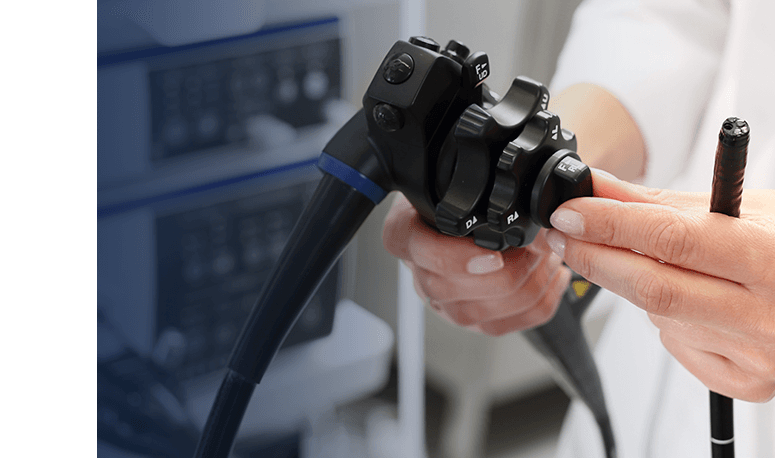
What Is Colorectal Cancer and How Dangerous Is It?
Colorectal cancer refers to cancer that originates in the colon (large intestine) or rectum, the final sections of the digestive tract. It is one of the most common types of cancer in Singapore.
Colorectal Cancer Is Actually Extremely Preventable
Most colorectal cancers begin as benign polyps, small growths on the colon or rectum's inner lining. These polyps often remain asymptomatic for years. The transformation of benign polyps into malignant tumours is a slow process, typically taking 10–15 years.
Colonoscopy is crucial in detecting and preventing colorectal cancer by enabling doctors to visualise and remove these polyps before they become cancerous, effectively interrupting the progression from benign growth to malignancy.
There Are Usually No Symptoms in the Early Stages
With over half of those diagnosed still being asymptomatic, this makes regular and timely screenings (colonoscopies) even more important.
Nonetheless, classic signs (particularly in more advanced stages) include:
- Persistent change of bowel habits
- Blood in stool
- Persistent changes in bowel habits
- Unexplained weight loss and fatigue
- Nausea and vomiting
What Are the Risk Factors for Colorectal Cancer?
Not everyone has the same risk of developing colorectal cancer. Understanding individual risk factors allows for earlier and more frequent screening, ensuring those who need it most receive the right care at the right time.
Generally, you should discuss colorectal cancer screening with your doctor:
- If you are above the age of 50
- If you have a family history of colorectal cancer
- If you have a personal history of colorectal cancer or polyps
- If you smoke, drink and have a diet high in fat, red meat and processed food
What Are the Stages of Colorectal Cancer?
Colorectal cancer advances through well-defined stages, each demanding tailored treatment strategies. Recognising this progression is crucial, as early detection significantly enhances the likelihood of successful treatment, whereas advanced stages necessitate more intensive and complex medical interventions.
With over half of those diagnosed still being asymptomatic, this makes regular and timely screenings (colonoscopies) even more important.
Precancerous Stage: A benign polyp is found during routine screening and commonly removed during a colonoscopy.
- Stage 0: Cancer has developed, but has not grown into the colon or rectal walls yet. This can be treated during a colonoscopy procedure.
- Stage 1 & 2: The cancer has grown into the colon and rectal walls, but has not affected nearby tissue yet. Surgery may be enough, but if the cancer has high-risk features, such as deep tumour invasion or aggressive cell growth, chemotherapy or radiation may be recommended.
- Stage 3: The cancer has grown into surrounding tissue and lymph nodes, past the colon and rectal walls. Surgery is needed to remove the part of the colon with cancer, followed by adjuvant chemotherapy.
- Stage 4: The cancer has now spread to other parts of the body, such as the lungs or liver. Treatment at this stage often combines surgery, chemotherapy, targeted therapy, immunotherapy, and radiation.
What Treatments Are Available for Colorectal Cancer?
Colorectal cancer treatment varies based on the stage, tumour location, and individual health factors. From minimally invasive surgeries to advanced systemic therapies, each approach is carefully chosen to target cancer while prioritising the patient’s life.

SurgeryColorectal surgery, including colectomy and laparoscopic Surgery, aims to remove tumours and prevent spread. Both methods improve survival rates and may be combined with other treatments for enhanced effectiveness.

ChemotherapyChemotherapy uses powerful drugs to destroy cancer cells, either by stopping their growth or preventing them from spreading. It is often administered after surgery to eliminate any remaining cancer cells, reducing the risk of recurrence. In some cases, it may also be used before surgery to shrink tumours.

RadiotherapyRadiotherapy uses high-energy radiation to target and destroy cancer cells, often minimising tumour size before surgery. When combined with chemotherapy, it enhances effectiveness by making cancer cells more vulnerable to treatment.

ImmunotherapyImmunotherapy harnesses the body’s immune system to recognise and destroy colorectal cancer cells more effectively. It is mainly used for advanced colorectal cancer, particularly those with specific genetic markers, or in cases where other treatments are ineffective.
Our Colorectal Cancer Specialists

Dr Dennis Koh
Medical Director & Senior Consultant Surgeon
B Med Sci (Nottingham), MBBS (Nottingham)
MMed (Surgery), FRCS (Edinburgh), FAMS
Dr Dennis Koh is an experienced colorectal surgeon, skilled in both open and minimally invasive colorectal surgery, including laparoscopic surgery, single-port surgery, and advanced endoscopic procedures such as colonoscopy.
Dr Koh strives to provide a customised treatment plan for each patient, which allows for better outcomes. He also honed his skills in proctology abRd in Geneva, bringing a more diverse touch to his practice.

Dr Sharon Koh Zhiling
Senior Consultant Surgeon
MBBS (Singapore), MMed (Surgery),
FRCS (Edinburgh), FAMS
Dr Sharon Koh is an experienced colorectal surgeon and the former Director of Endoscopy at Alexandra Health. She specialises in colorectal surgery, minimally invasive surgery, and advanced endoscopy.
Dr Koh completed her fellowship at Cedars-Sinai Medical Centre in the US after being awarded the Academic Medicine Development Award by the National University Hospital.

Dr Pauleon Tan Enjiu
Senior Consultant Surgeon
MBBS (Singapore), MMed (Surgery),
FRCS (Edinburgh), FACS
Dr Pauleon Tan has over 15 years of experience in public hospitals, specialising in minimally invasive surgery and endoscopy. He has subspecialty interest in treating colon, rectal or anal conditions using both traditional open or laparoscopic techniques.
Dr Tan undertook advanced colorectal surgical training at Japan’s Saitama International Medical Center after being awarded the Ministry of Health – Health Manpower Development Plan (HMDP) Award.


